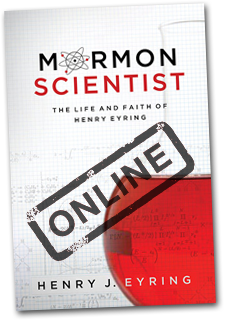Featured Book Review
Comments on the relationship of science & religion
On the Relationship of Science and Religion
While public perception is that a preponderance of scientists are atheists, the facts are otherwise. Dr. Eyring is far from alone in thinking that there is a spiritual dimension to reality and that a belief in God does not preclude the highest form of scientific thought.
Students of science — and otherwise — are entitled to know as part of their learning process that such great names as Eddington, Shrodinger, Jeans, Heisenberg, Hawking, Penrose, and Hoyle share this view, as did the great Alexander Graham Bell, Thomas Edison, and Nikola Tesla, the inventor of alternating current, the induction coil, micro-wave energy, and neon and fluorescent light. And to these names we must add the somewhat less familiar, but equally important name of Princeton University Professor Henry Eyring, developer of the mathematics which explains the otherwise mysterious quantum mechanics which dominates contemporary scientific thinking. Eyring was awarded every top prize in physics and chemistry with the exception of the Nobel Prize. He was nominated for the Nobel several times without success, many think because the Nobel jury prefers to award the prize to simple, straightforward discoveries in preference to more complex mathematical processes few can follow and even fewer comprehend. But Eyring’s work has provided explanations for hundreds of otherwise contradictory physical processes involving quantum mechanics.
Nor is it just scientists and mathematicians who have wondered at the inherent intelligence which evidently underlies existence: musicians like Chopin and Beethoven repeatedly said that their greatest compositions came into their minds in virtually completed form. Indeed, Beethoven had to hurry home from his walks along the Neckar River in order to write down the music he heard in his mind before he forgot it. All expressed the view that their greatest ideas arrived ready-made from some superior source. No “superstition”, let alone “religion”, in mentioning these facts to aspiring students of science. The thinking of these greats deserves to be taught more seriously than in a Sunday School class.
D. B. Timmins, PhD, Harvard
